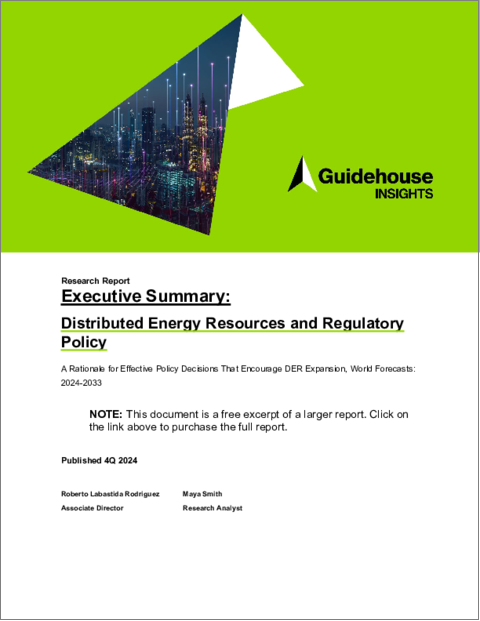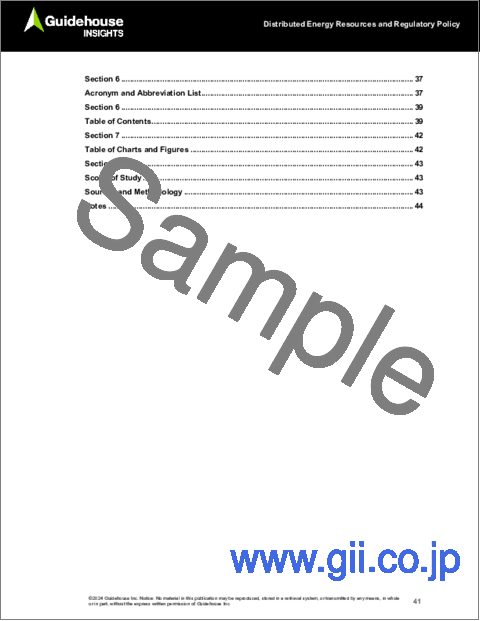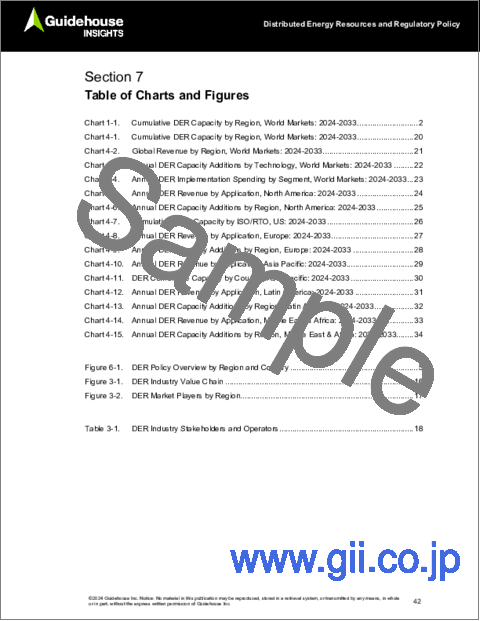|
|
市場調査レポート
商品コード
1640751
分散型エネルギー資源と規制政策:DER拡大を促す効果的な政策決定の根拠、世界予測(2024年~2033年)Distributed Energy Resources and Regulatory Policy: A Rationale for Effective Policy Decisions That Encourage DER Expansion, World Forecasts 2024-2033 |
||||||
|
|||||||
| 分散型エネルギー資源と規制政策:DER拡大を促す効果的な政策決定の根拠、世界予測(2024年~2033年) |
|
出版日: 2024年12月13日
発行: Guidehouse Research
ページ情報: 英文 45 Pages
納期: 即納可能
|
全表示
- 概要
- 目次
分散型エネルギー資源(DER)とは、従来の送電網に物理的または仮想的に追加することで、送電網をより効率的に機能させることができる小規模な技術です。気候変動が加速し、世界のエネルギー需要が増加し、石油・天然ガスが不足するにつれ、電力供給はますます難しくなっています。DERを利用する消費者は、コストを下げながら送電網の容量を拡大することができ、場合によっては送電網にエネルギーを売電することもできます。DERを持続可能かつすべての利害関係者にとって有益となるように送電網に統合することは困難であるが、政策と政策は、導入に伴う財政負担を軽減することで統合を支援することができます。
従来の市場では、事業者が各事業者の価格を設定していました。現在、一部の国ではエネルギー市場を分散化し、大企業がDERを大容量で送電網に接続できるようにしています。このやり方は価格設定の柔軟性を生むが、エネルギーを送電網に戻す際の複雑さが電力会社、政府、民間団体に問題を引き起こすため、価格設定がDERの障壁になる可能性があります。
当レポートでは、分散型エネルギー資源と規制政策について調査し、市場の概要とともに、競合情勢、市場の予測、地域別動向などをまとめています。
目次
第1章 エグゼクティブサマリー
第2章 市場の問題
- イントロダクション
- 促進要因
- 地域別概要
- 北米
- 欧州
- アジア太平洋
- ラテンアメリカ
- 中東・アフリカ
- 競合を激化させる規制
- 経済的インセンティブを高める規制
- グリッドの分散化と拡張
- 抑制要因
- 新しいシステムを導入するコスト
- インフラの不足
- 規模の経済
第3章 産業バリューチェーン
- 競合情勢
- 規制がバリューチェーンに与える影響
- 主要企業
第4章 市場予測
- 予測のイントロダクション
- 前提と調査手法
- 予測の定義
- 世界の予測
- 地域別予測
- 北米
- 欧州
- アジア太平洋
- ラテンアメリカ
- 中東・アフリカ
第5章 結論・提言
第6章 頭字語と略語一覧
第7章 目次
第8章 図表
第9章 調査範囲、情報源と調査手法、注釈
Policy is an important market driver for distributed energy resources (DER), small scale technologies that when added to the traditional grid physically or virtually can make it work more efficiently. As climate change accelerates, global energy demand rises, and oil and natural gas become scarcer, supplying electricity is increasingly difficult. Consumers using DER can expand the grid's capacity while lowering their costs, and sometimes, they can even sell energy back to the grid. Although integrating DER into the grid so that they are sustainable and beneficial to all stakeholders is challenging, policy and regulation can help integration by reducing the financial burden of implementation.
In the traditional market, operators set prices for each provider. Now, some countries have decentralized their energy markets so that larger companies can connect DER to the grid in larger capacities. While this practice creates pricing flexibility, the complexities of selling energy back to the grid create issues for utilities, governments, and private entities, so pricing can be a barrier to DER.
Table of Contents
1. Executive Summary
- 1.1 Introduction
- 1.2 Industry Value Chain
- 1.3 Market Forecasts
2. Market Issues
- 2.1 Introduction
- 2.2 Drivers
- 2.2.1 Regional Summaries
- 2.2.2 North America
- 2.2.2.1 California
- 2.2.2.2 Texas
- 2.2.2.3 New York
- 2.2.2.4 Georgia
- 2.2.2.5 Hawaii
- 2.2.3 Europe
- 2.2.3.1 Spain
- 2.2.3.2 France
- 2.2.3.3 Germany
- 2.2.3.4 Italy
- 2.2.3.5 Netherlands
- 2.2.3.6 UK
- 2.2.4 Asia Pacific
- 2.2.4.1 Japan
- 2.2.4.2 China
- 2.2.4.3 Australia
- 2.2.5 Latin America
- 2.2.5.1 Mexico
- 2.2.5.2 Chile
- 2.2.5.3 Brazil
- 2.2.6 Middle East & Africa
- 2.2.7 Regulations That Increase Competition
- 2.2.8 Regulations That Enhance Financial Incentives
- 2.2.9 Decentralizing and Expanding the Grid
- 2.3 Barriers
- 2.3.1 The Cost of Implementing New Systems
- 2.3.2 Lack of Infrastructure
- 2.3.3 Economies of Scale
3. Industry Value Chain
- 3.1 Competitive Landscape
- 3.1.1 Impact of Regulation on the Value Chain
- 3.1.2 Key Players
- 3.1.2.1 Importance of International Expansion
4. Market Forecasts
- 4.1 Forecast Introduction
- 4.2 Assumptions and Methodology
- 4.3 Forecast Definitions
- 4.4 Global Forecasts
- 4.5 Regional Forecasts
- 4.5.1 North America
- 4.5.2 Europe
- 4.5.3 Asia Pacific
- 4.5.4 Latin America
- 4.5.5 Middle East & Africa
5. Conclusions and Recommendations
- 5.1 Three Big Takeaways
- 5.2 Recommendations
- 5.2.1 DER Aggregators
- 5.2.2 DER Grid Operators
- 5.2.3 DER Regulators/Market Operators






